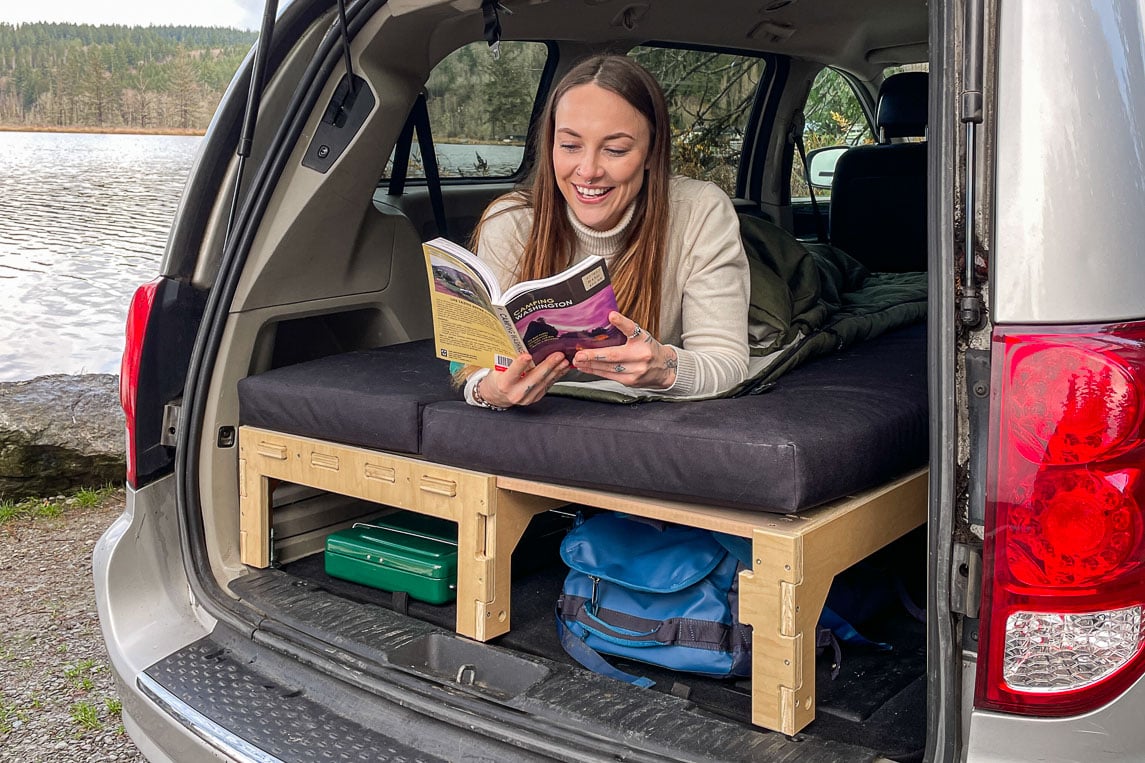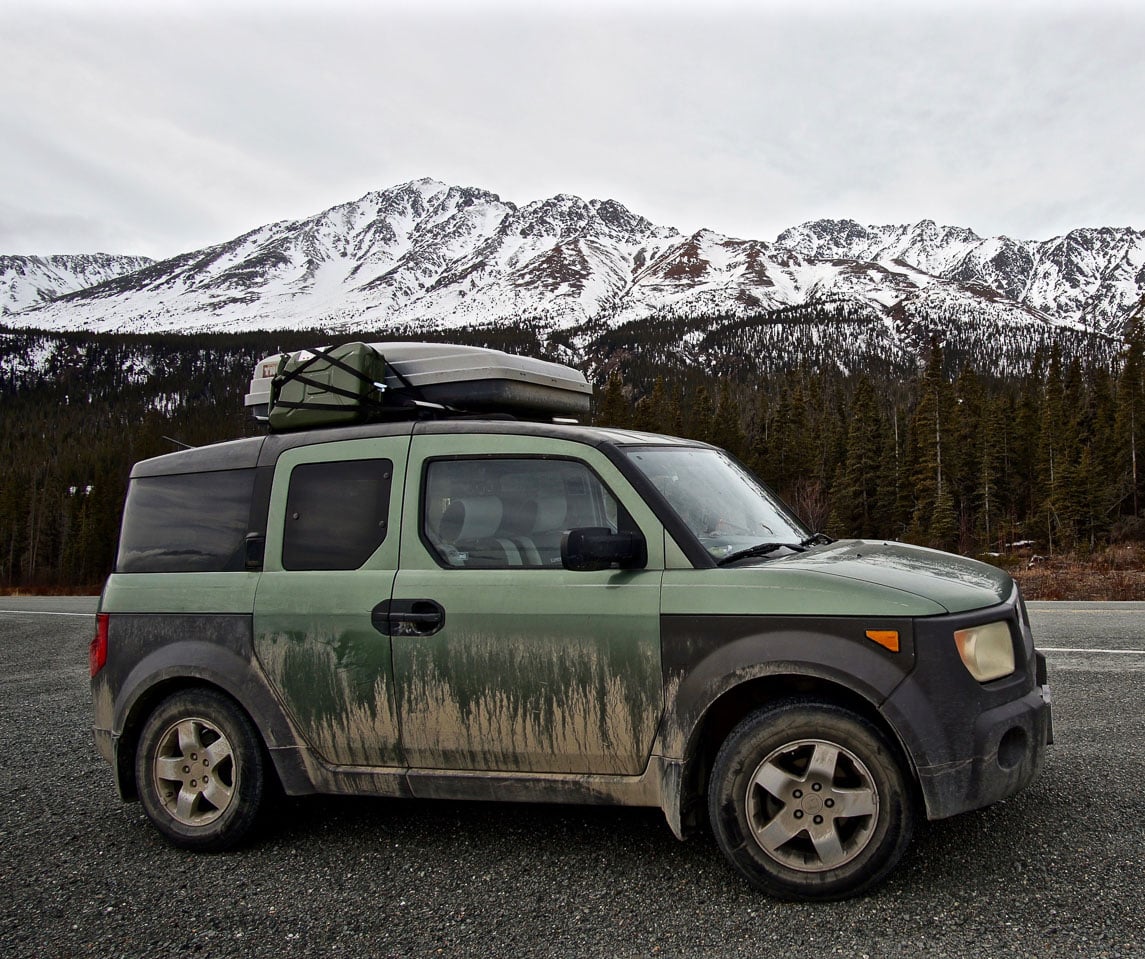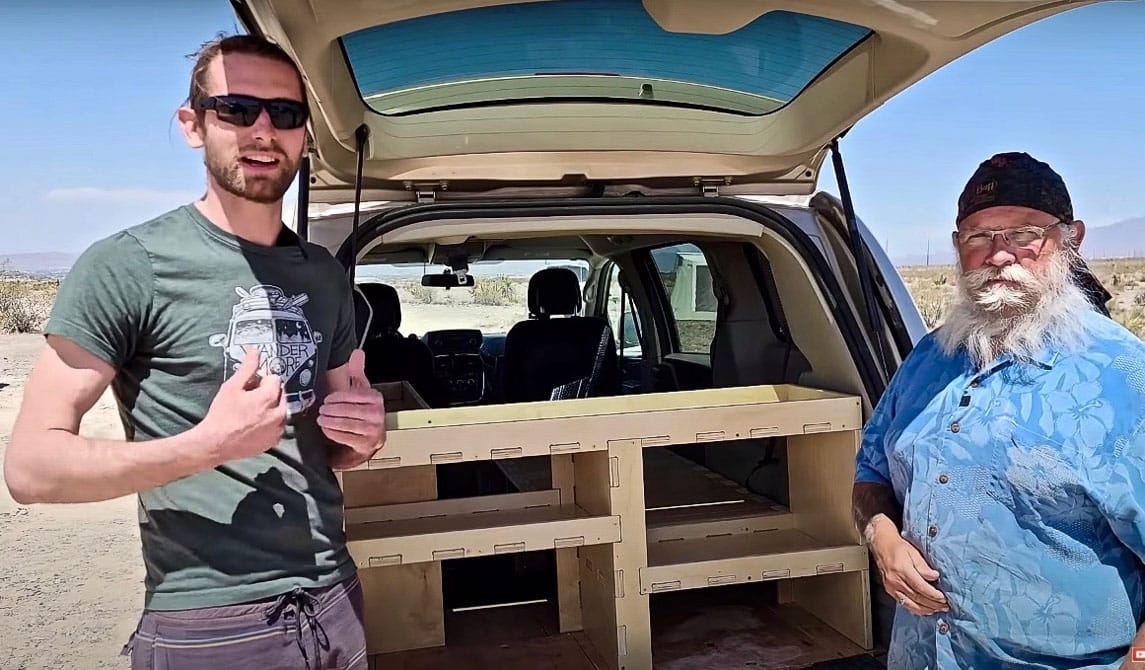Camp N Car is an outdoor brand based in the Pacific Northwest that’s giving everyday people a taste of vanlife from the comfort of their own vehicle. Co-Founder, and UW graduate, Steve Moore shares his thoughts on car camping, corporate culture, and the importance of connecting more people with nature.
What is car camping and what does Camp N Car do?
Car camping is just that, camping, but instead of a tent, van, or RV, you do it out of your car. Camp N Car makes high-quality wooden furniture that makes a car more comfortable to sleep in and easy to camp out of.

Comfy camper using a Trunk Bunk in a Dodge Grand Caravan
What is the appeal of car camping?
It’s super approachable. Vanlife in general is having a moment and I think that’s because a lot of people are disenfranchised by the current economic climate. Many people will never own a home, they don’t get much time off, and their lives are corralled into these tiny boxes of existence, and vanlife sets you free from that. Car camping specifically is even more approachable for people because you don’t need a fancy van or RV to get out into nature, yet you can retain a lot of the comforts of home. Plus, a car is a lot more eco-friendly than an RV. Your car can give you access to the kind of autonomy and travel that many people dream of. It can be a great way to unplug from the grind and reconnect with nature.
Why do you think it’s important for us to experience nature?
Getting outside is transformative, and I want more people to be able to experience that. Getting outside, away from the computer, the TV, and the phone; it’s a catalyst for making essential connections that are often suppressed by modern lifestyles. We can remove ourselves from the expectations of modern society and start to see things differently. Nature helps us focus on things that our inner selves have been trying to tell us, that nature has been trying to tell us. Being outside helps us reconnect with ourselves, with nature, and when it’s shared with others, it can help us reconnect with those we’re closest to. I think if more people did this more often, the world would be a much better place and people would be happier.

Custom Camper Build for Toyota RAV4
How do you mean?
So much of the modern world funnels people into a cycle of consumption or depletion. There’s not a lot of space to exhale, and connecting with nature gives us that breath we need to live well. Sure, we can connect over technology and gadgets, but that has a short-term effect. It doesn’t give you the time to analyze your life, to really decompress, and exert the mental vulnerability it takes to step outside of yourself. Getting outdoors gives your wound-up nervous system a break. Relaxing, seeing beautiful things, and getting a little exercise in a new environment can really give your personal energy a boost. It recharges you. When you’re in that state, you’re in a better place to process your feelings, really look at your life, and think about the world.
Do you think there is an emotional component to getting out into nature?
Absolutely. If you’re preparing for your first trip as a car camper, there’s the expectation versus the reality. You expect that it’ll be a fun adventure with some sightseeing, and while that can be true, you’ll also be alone with yourself, without the time constraints or constant pull of the modern world. You’re in a new environment, away from your community. Your mind can get amplified in nature when there’s nothing else distracting it. You might go through some loneliness or confrontations with different parts of yourself that you may have been too busy to look at before. This isolation can bring you back to yourself if you work through it and try to grow.
Vanlife and car camping isn’t always about collecting the most experiences; it’s more about removal from your daily routine. You see new things, meet new people, grow out of one’s old self, and transform. You can also bring friends with you, and if they also share a growth mindset, it can be a really emotionally grounding experience.
How did you get into car camping and vanlife?
In 2016 I visited Alaska with some friends for a long weekend trip out of Seattle. I immediately fell in love with the place. It was vast and wild and beautiful. I desperately wanted to go back and see so much more, and you can’t deeply explore a place like Alaska with limited PTO breadcrumbs. I was working for Washington Trails Association, and I met people doing seasonal work who lived out of their vehicles and had rather adventurous lifestyles. Here were these people who had outdoorsy jobs and got to explore some of the most beautiful parts of the planet because they were able to make their vehicles into tiny homes where they could live. The idea of car camping immediately appealed to me, and it opened up my eyes to an epic adventure opportunity.

Steve’s Honda Element driving through Alaska
So I decided to purchase a Honda Element and make my extended Alaskan adventure dreams a reality. My childhood friend Martin Nerbovig (a talented engineer) and I even designed and built a custom camper interior for the Element. In April 2018 I left Washington for Alaska for an extended six-month trip. It was the perfect time for me to do something like this because I was single, my career could be paused, and I was able to make money playing live music in the places I traveled. This is a piece of the puzzle that’s important to consider on extended trips; how to bring in money to support your nomadic bliss. I played fingerstyle acoustic guitar and Appalachian dulcimer in every kind of venue imaginable, from yoga studios to coffee shops, bars, and bookstores. People were really into it. I spent six months on the road in Alaska and northern Canada, camping out of the Honda Element, and simply fell in love with the whole experience.
How did Camp N Car start?
It started on a kind of fanciful whim. I left Alaska and moved back to Washington State in the Fall of 2018. The winters were just too cold up north for me to embrace vanlife year-round. My friend Martin had a sweet apartment in downtown Port Townsend with an open room and I moved in. We were both working demanding jobs and dealing with a lot of stress and burnout. We tossed around the idea of starting a camper conversion business since so many people had remarked on how cool our Honda Element project was. At one point in March of 2019, we had both just “had a day” with our jobs and on a whim, we were like, “Hey, what if we just went to wa.gov, formed an LLC, and made our own company?” That’s when we started laying the groundwork for the brand.
We got the company name, decided what we were going to offer and we started putting the word out to friends. Although we only had one build in our portfolio we knew we could do more. We did simple conversions for friends and family over the first few months and used that as our launchpad. Then, the word spread and we started getting clients who didn’t know us personally.
Martin and I grew Camp N Car slowly over time, reinvesting the money we had from our builds. I have to say how lucky I am that my parents had my back. I knew I always had a home to go back to if it didn’t work out and that gave me the courage and confidence to try something as risky as starting a new business. Eventually, I moved back to Seattle and Martin stayed in Port Townsend doing fabrication. When the pandemic hit, I was furloughed from my day job and had time to work more on Camp N Car. It helped keep me sane while the world was in such chaos and gave me time to focus.
What was your big break?
In early 2021, we connected with Bob Wells, founder of Cheap RV Living & The Home on Wheels Alliance. Bob is a famous vanlife and RV influencer, and his nonprofit was helping people on the edge of homelessness by giving them built-out minivans. After an initial meeting, we came up with the idea to design the Home On Wheels Kit for them and their clients. In April 2021 my now wife and I traveled to Pahrump Nevada in my Honda Element to celebrate and discuss the givingaway of our first Home On Wheels Kit. We did a video with Bob Wells, and they did the handoff to the clients for Bob’s YouTube channel. We got a lot of positive exposure from that. Our audience skyrocketed and demand really took off for our kits.

Bob Wells & Steve Featured on Cheap RV Living

The first Home On Wheels Kit in a HOWA client minivan
What was the early investment period like for Camp N Car?
We knew we needed investment funds to grow but we weren’t “bank loanable”. Fortunately, Port Townsend has the LIONS, the Local Investing Opportunities Network, which loaned us the money to help grow faster and meet this newfound demand. It’s kind of like our local version of Shark Tank, but it’s the Lion’s Den. We pitched to them and were able to get funding that allowed us to buy a CNC machine, move into a new facility, do some marketing, and get where we needed to be so we could fulfill demand. That was pivotal growth and we wouldn’t be here in the same way if it wasn’t for them.
What are your thoughts on the future of the outdoor industry?
There is so much room for positive societal and environmental change to co-exist and flourish and I think the outdoor industry should be an advocate for that. I see this industry as very different from how a lot of startups, tech companies, and hustle-culture tend to do things. A lot of those companies create an ecosystem that values profit over people and community. These companies send rockets to space while strapping time-keeping monitoring devices on the wrists of people who do exhausting work in fulfillment warehouses where their entire day is watched. None of us evolved to live like that. That’s not community.
This kind of extraction of human potential and human freedom takes a toll on us all, even if the end customer never sees it. I think companies should use their profits to help humanity and care for the planet. The outdoor sector can play a big role in this. Yes, I know one little company isn’t going to single-handedly save the world, but I think everyone should do their part. And when you run a company, even a small one, you can start by doing what’s right.
How is Camp N Car supporting this larger goal of helping people and the planet?
We have made intentional decisions about how we operate and what we provide our customers. Most of our employees have a four-day work week and everyone gets generous time off allotments. We don’t ask our employees to overwork and we prioritize the well-being of everyone who comes into our orbit. Perhaps this goes against the “work-yourself-to-the-bone” culture this country often rewards, but if you normalize treating people well while still being successful it changes the status of how business is done. In this way, we can slowly begin to reverse the toxic trend of burn-out culture that’s rampant in the working world. Also, our products are made in America, with high-quality materials, by skilled professionals who enjoy what they do.

Steve hiking in Alaska

Camping out in a pickup truck with a Trunk Bunk
So you’re not a fan of the hustle?
Unlike many leaders in the business world, I don’t see American capitalism as the ultimate expression of human nature. We need to value our well-being as a species over greed and profitability. How things are is not how they have to be, we still have the power to change the trajectory of humanity. Sometimes all it takes is a commitment to foster a more mindful way of living to make a difference for our communities. All of us can pay attention to how we talk and listen, as well as how we vote and advocate. We owe it to ourselves to break the cycle of toxic corporate culture that’s poisoning our communities and the planet.
What would you say to first-timers thinking about vanlife and car camping?
Give it a try and see if you like it, but start small. Just throw a mattress in the back of your car and see if it’s somewhere you could sleep. Test it out. You don’t need anything fancy to try it for a couple of nights, and you’ll know right away if you like it or not. It’s kind of like starting the guitar. You don’t need the best guitar and a ton of fancy gear. Start small and simple and then, if you really get into it, add on to your gear and level up your setup.
What is your advice for other emerging entrepreneurs in the outdoor space?
Make sure you’re doing something you have both a passion for and some experience in. It doesn’t have to be your favorite thing, but it does have to be realistic and have market viability. Your passion can help you get through the parts of running a business that aren’t so fun, and having market viability will help you make something of your idea, which is rewarding in itself.
I believe it’s possible to live in a world where each of us is invested in something that we feel a personal connection with. That’s where the good life is; being involved in your community in a meaningful way that brings value to the lives of others. Sure, starting your own business is risky, but so is corporate burnout, as is supporting a way of life that’s ruining humanity and killing the planet. Be in it for the long haul; entrepreneurship isn’t a get-rich-quick scheme. Build something of quality, be mindful of your impact and processes, and nurture a flexible approach that doesn’t buckle under the weight of difficult seasons and circumstances.
About Camp N Car
Camp N Car makes high-quality modular camping furniture that can transform your vehicle into a comfortable home on wheels for a better night’s sleep and more autonomy on the road. Camp N Car’s products are made in America, at our shop in Port Townsend Washington, by skilled professionals who take pride in their work. We also create world-class custom van conversions for people ready to take their road adventures to the next level. Our employees enjoy a 4-day work week, generous time off allotments, and a work-life balance that gives them the time and means to enjoy the good life. When you buy from Camp N Car, you’re putting people over profits, and making a decision to support a company that’s changing corporate culture, and building a better world, one car at a time. For more, visit: https://campncar.com

Custom conversion for Ford Transit Connect
